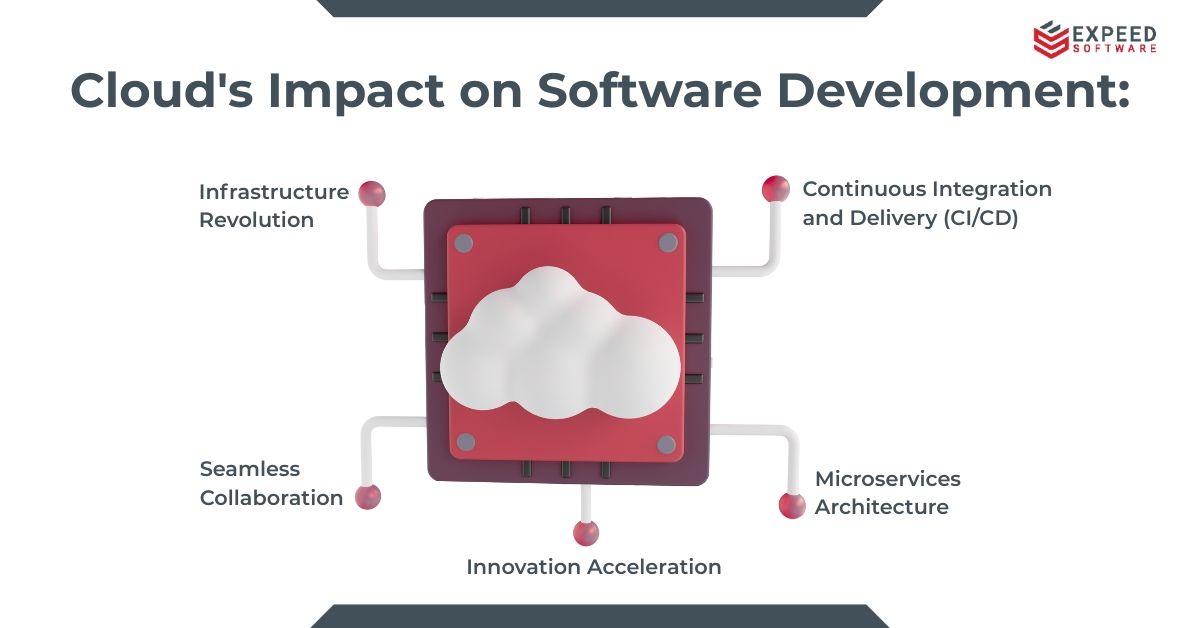The sector of software development has been shifting gears evolving towards rapid progression over the years. One of the major milestones in the timeline of software development is undoubtedly the introduction of cloud computing technologies. The benefits of cloud software development helped the developers to push beyond their limits while creating applications.
In this article, we will be exploring how the introduction of cloud technologies impacted the sector of software development.

The Infrastructure Revolution
Software development wasn’t as much of a cakewalk as it is today. Developers had to juggle around multiple hurdles to set up infrastructure, procure servers and maintain data-centers. These processes were not only time-consuming but also costly to implement in an efficient and secure manner. It was then, the advent of cloud technologies sparked a seismic shift, propelling software development to new heights of innovation.
Switching to the present era, developers are easily navigating the realm of software development with the perks cloud technology brought into the picture. With Infrastructure as a Service (IaaS) from providers like AWS, Azure, and Google Cloud, developers can spin up virtual servers in minutes. No more hardware procurement or physical maintenance. This dramatic shift in the overall cloud software development process contributed largely towards faster development cycles, reduced operational costs, and increased flexibility. In short, if the traditional development process was like constructing a house brick-by-brick, currently it is more like bringing together the pieces of a prefabricated house!
Seamless Collaboration Through Cloud Based Software Development
In the past, communication among distributed software development teams was a common hurdle, causing communication gaps resulting in inefficient and longer development cycles. Misunderstandings and misalignments amongst developers became a common matter of concern because of the same. The absence of a centralized platform caused version conflicts, duplicated work and fragmented updates. Tracking code changes and managing multiple versions of a project proved cumbersome, resulting in delayed releases and compromised code quality.
The cloud platforms, along with the integration of tools such as GitHub, Bitbucket, and Azure DevOps now offer centralized code repositories, providing seamless code sharing, real-time tracking, and robust version control. This helps developers to efficiently collaborate on the same project from different geographical locations through cloud software development. Such an environment largely omitted the issues with code conflicts and synchronization. Taking collaboration a step further, cloud based integrated development environments (IDEs) like AWS Cloud 9 and Replit allow developers to code in real-time. These platforms offer a shared code-space where developers can write, edit and debug codes simultaneously without bottlenecks.
Continuous Integration and Delivery (CI/CD)
Gone are the days when developers waited for weeks and months for their updates to get released. Manual testing, deployment errors, and lack of visibility further delayed releases, increasing time-to-market and frustrating both teams and customers. Thankfully, those days are a thing of the past now.
Continuous integration and continuous delivery pipelines have changed the above scenario in a transformative way. Platforms such as Gitlab CI/CD, Jenkins, etc provide fully automated pipelines in cloud software development that could handle code integration, testing, deployment, and monitoring. This makes sure that every code is tested and deployed without manual intervention, thereby accelerating the delivery process. Cloud-powered CI/CD pipelines are not just about speed—they create a robust foundation for innovation, enabling developers to experiment, iterate, and push boundaries without fear of deployment failures.
Attaining Agility with Microservices Architecture
One of the major complications the development team had to deal with initially were the monolithic architecture of applications. Because of this structural complexity, scaling of such applications was a demanding process. Maintenance was time-consuming, and even minor updates required redeploying the entire application, increasing downtime and reducing agility.
With cloud technologies, microservices architecture stepped into the picture and the division of applications into manageable, small deployable chunks became possible. For seamless orchestration of such a microservices architecture in cloud software development, platforms like Kubernetes can be utilised. This helped the updation, deployment and scaling of each microservice in a structure without disturbing any other components, urging the development process to be more agile and responsive. Containers play a key role in this architecture, providing lightweight, portable environments that ensure consistency across development, testing, and production. With automated scaling and load balancing, applications can handle varying workloads efficiently.
How Cloud Based Software Development Ignite Unlimited Innovation in the Digital Age
The best thing about cloud computing was that it always helped developers to race towards innovation, breaking the traditional barriers of development. In the past, resource limitations and high infrastructure costs stifled experimentation, making it risky and expensive to test new ideas. Today, with pay-as-you-go models and free-tier access, developers can experiment freely without hefty investments. Serverless computing solutions like AWS Lambda and Azure Functions further simplify the process by eliminating server management, allowing teams to focus solely on building and refining applications. This shift has accelerated innovation, enabling faster prototyping, cost-effective development, and quicker time-to-market for groundbreaking ideas.
Final Word
In a world where the pace of innovation defines market leaders, cloud computing is no longer a luxury — it's a necessity. It has democratized software development, empowering companies of all sizes to build and scale solutions with unprecedented agility. By removing infrastructure barriers, cloud platforms have given developers the freedom to experiment, collaborate, and bring ideas to life faster than ever before.
At Expeed Software, we harness the power of cloud software development to build tailored solutions that drive growth and innovation. Our expertise in cloud based software development ensures your development journey is seamless, efficient, and future-proof. Whether you're modernizing legacy systems or developing the next big application, Expeed Software is your trusted partner in exploring the future of cloud computing in software. Let’s build the future together!

Expeed Software is a global software company specializing in application development, data analytics, digital transformation services, and user experience solutions. As an organization, we have worked with some of the largest companies in the world, helping them build custom software products, automate processes, drive digital transformation, and become more data-driven enterprises. Our focus is on delivering products and solutions that enhance efficiency, reduce costs, and offer scalability.


